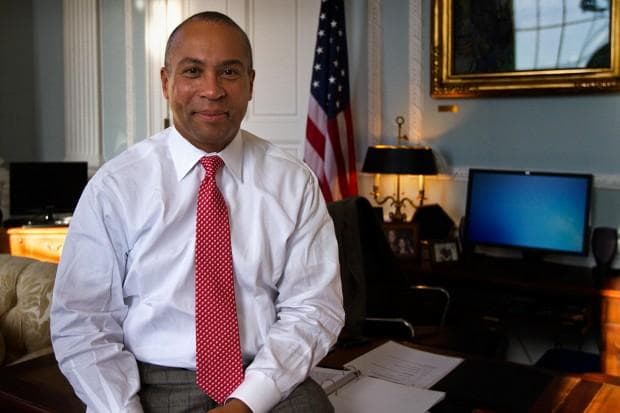Advertisement
Gov. Patrick Looks Ahead To Final 2 Years In Office

As Deval Patrick embarks on the final two years of his second - and he says his last - term as governor, the Democrat is grappling with recent failures of government oversight, a lackluster economy, a cabinet shake-up and increasing speculation about who might take his place on Beacon Hill.
Still, Patrick has remained upbeat, dismissing chatter about his lame duck status and vowing to push ahead with what he said is the unfinished business of his administration.
"We have a legislative agenda that we've been developing," Patrick told reporters recently. "We'll be presenting that package, as they say, in the fullness of time."
Patrick is coming off a year of political highs and lows.
He reveled in two proxy victories with the re-election of political ally and friend President Barack Obama and the success of Democrat Elizabeth Warren, who ousted incumbent Republican U.S. Sen. Scott Brown.
Those victories, however, were tempered with a gradual ticking up of the state's unemployment rate and sluggish state revenues.
Also adding to Patrick's woes were allegations that a chemist at a former state public health department lab manipulated drug tests that threatened to unravel thousands of criminal cases. A deadly nationwide outbreak of fungal meningitis linked to a Massachusetts pharmacy also called into question the state health department's oversight of compounding pharmacies.
This month Patrick announced four members of his cabinet would be leaving, including Health and Human Services Secretary JudyAnn Bigby. Patrick insisted all chose to leave on their own.
Patrick will get a chance to reboot his administration when he outlines many of his priorities for the new legislative session in his annual state of the state address scheduled for mid-January. The two-year session begins when House and Senate lawmakers are sworn in Wednesday.
Patrick has already telegraphed some of his goals.
They include plans to overhaul the way the state pays for its transportation system and tougher gun control measures in the wake of the school shooting in Connecticut that left 20 children and 6 school staff members dead.
Patrick's gun control measure, which predated the shooting, would restrict licensed gun owners to purchasing one firearm a month and clamp down on so-called "straw purchasers" who buy guns legally and resell them to convicted felons and others barred from owning guns.
House Speaker Robert DeLeo and Senate President Therese Murray, both Democrats, have already said they also hope to pass additional gun restrictions.
Patrick said another priority will be to follow through on the state's efforts to reduce health care costs and curb violence among young people.
In August Patrick signed a health care cost containment bill intended to save Massachusetts up to $200 billion in spending over the next 15 years by encouraging "accountable care organizations" that are rewarded for taking a more coordinated approach to medicine while also giving residents better access to their medical records and reducing unnecessary testing.
The law is intended to slow spiraling costs that threaten to undermine the state's landmark 2006 health care law. A commission has been created to oversee the new law.
If Patrick hopes to have a strong finish during his last two years in office, he'll have to buck historical trends. Final terms haven't been kind to recent Massachusetts governors.
Former Democratic Gov. Michael Dukakis had one of the toughest last two years in office, made all that much more difficult because he had just come off a year during which he had won the Democratic Party nomination for president only to lose to then Republican Vice President George Bush in the 1988 election.
Dukakis returned home to find the economy once dubbed the "Massachusetts miracle" foundering. He joined with state Democratic leaders to push through hefty tax hikes.
The man who followed Dukakis into the governor's office, Republican William Weld, easily won re-election in 1994, but failed to serve out the four-year term. Weld resigned in 1997 to pursue after he was nominated to become U.S. Ambassador to Mexico, but that was blocked by the late GOP Sen. Jesse Helms, then chairman of the Senate Foreign Relations Committee.
When Weld left, his then-Lt. Gov. Paul Cellucci stepped in as acting governor and later won the office outright in 1998. Cellucci also resigned before the end of his term to become the nation's ambassador to Canada.
Mitt Romney, who won the next governor's race in 2002 and served only one term, announced after three years that he had accomplished all he'd set out to do as governor as he cleared the way for his first unsuccessful run for president in 2008. Unlike Weld and Cellucci, however, Romney served out his final year.
Patrick, perhaps sensitive to the recent history of governors bolting before the end of their terms, has also vowed to serve out his final two years.
That, of course, has led to increasing speculations about who might run for governor in 2014.
Among the possible contenders are Democrats Lt. Gov. Timothy Murray and Treasurer Steven Grossman and Republican Charles Baker.
This program aired on December 30, 2012. The audio for this program is not available.